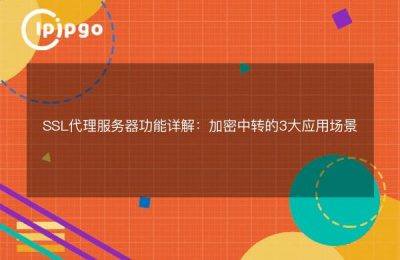
First, why use proxy IP with Beautiful Soup?
Guys who have engaged in data crawling know that the website anti-climbing mechanism is now more and more strict. You take an ordinary IP to grab data, light speed limit, heavy direct seal. At this timeproxy IPIt becomes a life saver - especially like ipipgo, a service provider specializing in high stash proxies, each request for a different IP, the site can't tell if you're a real person or a crawler.
To cite a real scenario: you want to catch the price of an e-commerce platform, with their own home broadband connected to the request 50 times, the results of the third time on the seal. Switch to ipipgo's dynamic proxy pool, each request randomly switch the country's different regions of the IP, the success rate directly pull to 95% or more.
import requests
from bs4 import BeautifulSoup
proxies = {
'http': 'http://username:password@gateway.ipipgo.com:9020',
'https': 'http://username:password@gateway.ipipgo.com:9020'
}
response = requests.get('https://target-site.com', proxies=proxies)
soup = BeautifulSoup(response.text, 'html.parser')
Second, configure the proxy IP of the three major pitfalls
The easiest place for a novice to fall:
1. Wrong authentication method: ipipgo's proxy requires dual authentication with account and password, and many people leave out the authorization parameter in the code
2. Protocol mismatch: Accessing a https site but using a http proxy is like taking a bus card and using a subway gate.
3. IP Survival Time
Now on the market agent service providers of varying quality, some claimed millions of IP pools, the actual availability of less than 30%. ipipipgo is mainly interested in theirSurvival detection mechanismThe system automatically eliminates failed nodes every minute. Measured continuous crawling for 6 hours, the number of request interruptions does not exceed 3 times. Don't panic when you get a CAPTCHA pop-up, try this combo: ① Use ipipgo'sResidential Agents(mimics real user network environment) Q: What should I do if the proxy IP suddenly fails to connect? Q: How do I verify if the agent is in effect? Q: What should I do if I encounter an SSL certificate error? Here's a comparison table for you to see why ipipgo is recommended: Finally, a piece of cold knowledge: when using a proxy IP to capture data, it is best to pair it with ipipgo'sIP Hot and Cold ReplacementFunction. The high-frequency use of the IP automatically marked, cooled down 2 hours before reuse, can significantly reduce the probability of banning. This function is currently only their home to do a more perfect, pro-measurement can reduce the probability of blocking IP from 40% to 7% or so.Third, the actual combat: breakthrough anti-climbing tart operation
② Adjust the headers information of requests.
③ Randomly set the request intervalheaders = {
'User-Agent': 'Mozilla/5.0 (Windows NT 10.0) AppleWebKit/537.36 (KHTML, like Gecko) Chrome/99.0.7113.93 Safari/537.36',
'Accept-Language': 'en-US,en;q=0.5'
}
for page in range(1, 100): 'Accept-Language': 'en-US,en;q=0.5' }
time.sleep(random.uniform(1, 3)) random wait
response = requests.get(f'https://xxx.com/page/{page}', headers=headers, proxies=proxies)
IV. Summary of QA high-frequency issues
A: First check your account balance, then try the "Emergency Channel" function in the backend of ipipgo, which will automatically assign a backup server.
A: Visit http://icanhazip.com to see if the IP returned is in the proxy pool.
A: add in requests.get()verify=Falseparameter, but remember to use it in conjunction with ipipgo's HTTPS-only proxy.V. Hard indicators for selecting agent service providers
norm
General Agent
ipipgo
IP Survival Time
2-15 minutes
30 minutes guaranteed
geographic location
3 cities
Coverage of 34 provinces
Concurrent requests
Up to 5 threads
Support 500+ concurrency








